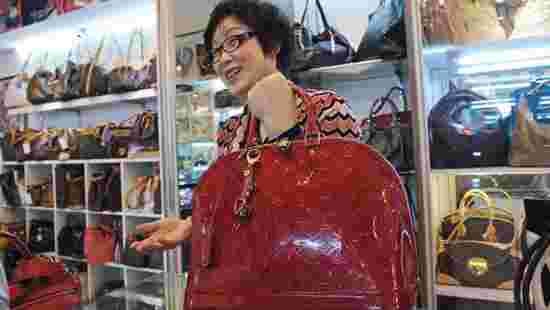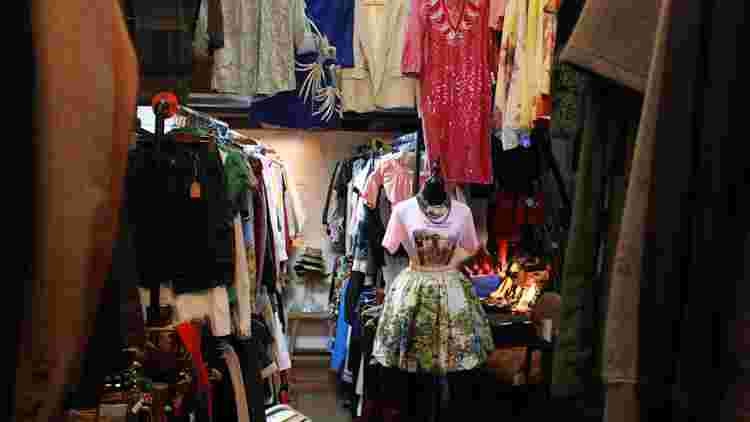
Culture
20:50, 11-Oct-2017
Luxury consignment shopping resurrects in China, spreads like wildfire
Keely Stanley

Japan was the leading Asian country for buying items on the vintage market. Much like in Western culture, consumers had a strong desire to get their hands on the "gently touch" latest vintage bag, but China was slow to accept this lifestyle. Chinese consumers wanted the real thing.
As more affluent Chinese nationals travel around the world and get access to brand name products, they are re-selling their luxury items to China’s middle class. Which in return is fueling the “consignment shopping” industry in both quantity and popularity. Now, young Chinese shoppers, with a monthly income of approximately 2,500 US dollars, have the chance to purchase name brand items such as Louis Vuitton, Chanel and Marc by Marc within their budget.
Like most sectors in China, technology has played a considerable role in revamping the need and love for pre-owned luxury goods. Within a year, live streaming apps have driven consumers into consignment stores online and offline to find the latest and often the only luxury piece sold at a discounted price.
Xian Yu App
Taobao launched a second-hand app called, Xian Yu (闲鱼), which translates to “Idle Fish,” but as a translation for its English-speaking users, the creators renamed it to “sharing fish.” The phrase is a reference to their “fish pond” community, which are user groups based on location. The concept is to offer a community platform based on users' location and interest in each user, allowing more ideas and hobbies to be shared while searching for the next hot item.
Husdon Lockett, a business analyst wrote in his report on the rise of the second-hand market in China:
“…Taobao, the online retail platform of e-commerce conglomerate Alibaba Group, has launched its second-hand goods site, Xian Yu, which now purports to facilitate daily sales of 200,000 used products. The platform seeks to distinguish itself from Taobao proper by pitching itself as a social as well as commercial experience in order to foster greater trust among users…"
Mogujie App
With over 130 million registered users, of whom eight million are active daily, Mogujie targets young Chinese females. Consumers refer to the app as a platform where they can exchange ideas, experiences, product information, and deals on the latest shopping trends.
What makes Mogujie appealing to second-hand buyers is that it has branded itself as a "fashion buyer" platform, creating a stylish environment for fashionistas and local business owners to create transactions. Their items are available for purchases either via merchants hosted by Mogujie or through other e-commerce sites which are paying referral commissions to Mogujie, according to a report by chinaebuyers.com.
Although the apps have their credit rating system, there are still critics on these websites that cast suspicion on the items and speak of fraud. Consumers are concerned about purchasing non-authentic products at an overpriced cost. It turns out, the old fashion way of shopping is still valued.
Emerging luxury consignment shops around China

Second-hand luxury handbags are displayed at a Milan Station outlet in Hong Kong, September 2, 2013. /Reuters Photo
Second-hand luxury handbags are displayed at a Milan Station outlet in Hong Kong, September 2, 2013. /Reuters Photo
--MILAN STATION--
Milan Station is the most popular consignment shop nationwide and runs in the lap of luxury. The retail store primary focuses on selling designer bags to women from all walks of live – celebrities, everyday working women, and housewives. The company is based in Hong Kong with operations in Beijing, Macao and Taiwan.
It’s the most used second-hand store in China. Known for its expensive taste but low-end price tag, one should move fast as their limited-edition and rarer bags fly off the shelves fast. The company specializes in today’s hottest brands such as Chanel, Dior, and Yves Saint Laurent.

Pawnstar is a full-fledged boutique based in Shanghai. / Photo via Stylites.com
Pawnstar is a full-fledged boutique based in Shanghai. / Photo via Stylites.com
--PAWNSTAR--
Pawnstar recently opened their flagship store in Shanghai’s famous French Concession Townhouse. The company functions as a consignment shop offering second-hand luxury goods. Sellers bring their items to the store or take their pieces to the company’s brick-and-mortar store, and the appraisers evaluate items for condition and authenticity.
According to a recent press release, Pawnstar's new location will have a studio devoted to live-streaming as well as an area exclusively dedicated to menswear, an section which the local market has been under-serving.
Founder and CEO Jane Jia says: “In this new flagship, Pawnstar will foster development of a community that is stylish, eco-conscious, and fun with a regular program of pop-ups, events, and guest speakers…we hope to build wider acceptance in China for the concept of second-hand fashion and also to experiment more with online to offline projects and innovative ways of using live-streaming.”
Pawnstar will also seek to introduce more products outside of fashion such as soap, detergent and biodegradable utensils and flatware.

Secoo sells second-hand luxury goods for China’s middle class. / Photo via Retail Design Blog.net
Secoo sells second-hand luxury goods for China’s middle class. / Photo via Retail Design Blog.net
--SECOO--
Secoo is a Chinese premium platform that offers upscale vintage products, watches and handbags sold online and offline.
As reported in a press release by Nasdaq, Secoo has built a trusted and comprehensive global supply chain for upscale products and lifestyle services that are designed to meet the diverse purchase preferences and needs of customers, varying from in-season luxury products, highly sought-after classic styles, to vintage and rare products. Secoo prides itself on high quality and applies its sophisticated authentication procedures to ensure that every product offered on its platform is authentic.
Richard Rixue Li, chairman and chief executive officer of Secoo Holding Limited, told Nasdaq, "China's economy is transforming, and consumers are increasingly shifting their consumption preferences toward upscale products and services. With over 300,000 SKUs, covering over 3,000 global and domestic premium brands, Secoo has become Asia's largest online integrated upscale products and services platform, and is uniquely positioned to best serve Chinese consumers' growing needs.”
As China's consumer market continues to shift its attitudes towards upscale vintage items and services, these second-hand stores – online and off the web - will continue to thrive in the ever-changing Chinese market.
(Top photo courtesy of China Daily)

SITEMAP
Copyright © 2018 CGTN. Beijing ICP prepared NO.16065310-3
Copyright © 2018 CGTN. Beijing ICP prepared NO.16065310-3